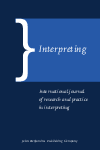
Interpreting
Scope & Guideline
Championing excellence in interpreting research and practice.
Introduction
Aims and Scopes
- Interpreting Practice and Pedagogy:
This area explores the methodologies and approaches to interpreter training, emphasizing the development of skills and competencies necessary for effective interpreting in various contexts. - Cognitive and Psycholinguistic Aspects:
Research in this domain examines the cognitive processes involved in interpreting, including language processing, decision-making, and the impact of experience on performance. - Technological Integration in Interpreting:
The journal highlights the role of technology in interpreting, investigating how digital tools and platforms are reshaping the practice and training of interpreters. - Ethics and Ideology in Interpreting:
Scholarly articles address the ethical considerations and ideological influences that affect interpreters, particularly in sensitive contexts such as legal or healthcare interpreting. - Cultural and Sociolinguistic Dimensions:
This scope encompasses the study of intercultural communication and the social dynamics at play in interpreting, focusing on power relations and the role of interpreters in various environments.
Trending and Emerging
- Remote Interpreting and Digital Technologies:
With the rise of remote interpreting, especially accelerated by the pandemic, there is a growing emphasis on understanding the implications of technology on interpreting practices and interpreter training. - Cognitive Load and Performance Metrics:
Research focusing on cognitive load in interpreting tasks and its impact on performance is increasingly prevalent, highlighting the need for empirical evidence to support training methodologies. - Interpreting in Healthcare and Legal Contexts:
There is a marked increase in studies addressing the specific challenges and practices of interpreting in healthcare and legal settings, reflecting a heightened awareness of the importance of effective communication in these critical areas. - Intercultural Communication and Power Dynamics:
Emerging studies are increasingly exploring the role of interpreters in navigating power relations and cultural nuances, underscoring the social responsibilities of interpreters in diverse contexts. - Training Innovations and Educational Strategies:
The focus on innovative training methods, including digital tools and multimedia resources for interpreter education, is gaining momentum, aiming to enhance the effectiveness of interpreter training programs.
Declining or Waning
- Historical Perspectives on Interpreting:
Research focusing on historical contexts and case studies of interpreters in specific historical events has seen a decline, suggesting a move towards more contemporary issues and practices. - Traditional Modes of Interpreting:
There is a noticeable decrease in publications dedicated to conventional interpreting methods, such as face-to-face consecutive interpreting, as the field increasingly embraces remote and digital practices. - Generalized Theoretical Frameworks:
The journal appears to be moving away from broad theoretical discussions without direct application to practice, favoring empirical studies that provide concrete insights into interpreting processes.
Similar Journals
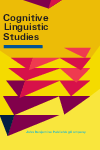
Cognitive Linguistic Studies
Exploring the Interplay of Language and ThoughtCognitive Linguistic Studies is a prestigious journal published by JOHN BENJAMINS PUBLISHING CO, dedicated to advancing the interdisciplinary field of cognitive linguistics. With an ISSN of 2213-8722 and an E-ISSN of 2213-8730, the journal serves as an essential platform for the dissemination of high-quality research that delves into the intricate relationships between language, thought, and cultural contexts. Located in the vibrant academic milieu of the Netherlands, this journal has gained recognition for its impactful contributions, reflected in its respectable Q2 category ranking within the field of Linguistics and Language as of 2023. Redesigned to accommodate a broader audience, the journal welcomes original research articles, reviews, and theoretical discussions that bridge cognitive science and linguistic inquiry. As the journal continues its trajectory of growth, being indexed with a solid Scopus rank of #459 out of 1167 in the social sciences, it remains a vital resource for researchers, professionals, and students eager to explore the dynamic interplay between cognition and language.
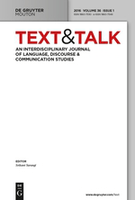
Text & Talk
Bridging Communication, Linguistics, and PhilosophyText & Talk, published by DE GRUYTER MOUTON, is a premier academic journal that serves as a pivotal platform for interdisciplinary scholarship in the fields of Communication, Linguistics, and Philosophy. With its ISSN 1860-7330 and E-ISSN 1860-7349, this Germany-based journal has established a robust presence since its inception in 2005, continuing through 2024. Currently ranked in the Q1 category for both Linguistics and Philosophy, and Q2 in Communication, Text & Talk demonstrates a significant impact within the scholarly community, as reflected in its impressive Scopus rankings across various disciplines. The focus of the journal is to foster rigorous discussions and innovative research on the multifaceted nature of spoken and written discourse, making it indispensable for researchers, professionals, and students eager to explore the interplay between language, context, and communication practices. As an open access title, it enhances visibility and accessibility to cutting-edge research, further solidifying its role as a vital resource in the academic landscape.
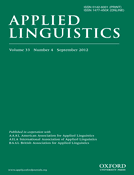
APPLIED LINGUISTICS
Advancing Knowledge in Linguistics and CommunicationApplied Linguistics, published by Oxford University Press, is a premier scholarly journal that has significantly contributed to the fields of linguistics and communication since its inception in 1980. With an impressive impact factor and ranked in the top quartile (Q1) in both Communication and Linguistics and Language categories, Applied Linguistics is recognized for its rigorous peer-reviewed articles that explore the intersections of language, society, and cognition. The journal enjoys a remarkable position in the Scopus rankings, placing it among the top 2% of publications in its discipline. Researchers, professionals, and students benefit from its comprehensive scope, which encompasses innovative research on language acquisition, discourse analysis, and applied linguistics methodologies. Although not an open access journal, its commitment to advancing knowledge and fostering academic discussions makes it an indispensable resource for anyone interested in the critical role of language in various contexts.
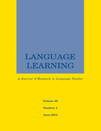
LANGUAGE LEARNING
Elevating discourse in linguistics and education.LANGUAGE LEARNING is a premier academic journal dedicated to advancing the field of language acquisition and education, published by Wiley. With a foundation dating back to 1948, the journal has carved an esteemed niche in the academic landscape, currently holding a prestigious Q1 rank in both the categories of Education and Linguistics and Language. It proudly occupies the 9th percentile rank in the Arts and Humanities domain and the 10th percentile in Social Sciences, illustrating its influence and reach. The journal publishes high-quality research that explores various dimensions of language learning, from cognitive processes to pedagogical approaches, making it an essential resource for researchers, educators, and students alike. Although Access options are non-open, the journal remains accessible to a wide audience, reinforcing its commitment to disseminating critical insights within the academic community.
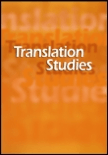
Translation Studies
Transforming Language Through Groundbreaking ResearchTranslation Studies is a premier journal in the field of linguistics and language, published by Routledge Journals, Taylor & Francis Ltd, and is recognized for its exceptional impact within the academic community, boasting a Q1 classification in Linguistics and Language as of 2023. With its ISSN 1478-1700 and E-ISSN 1751-2921, this journal serves as an eminent platform for disseminating groundbreaking research, theoretical advancements, and practical applications related to translation and interpreting studies. Covering a comprehensive scope, the journal publishes original research articles, critical reviews, and theoretical discussions, making significant contributions to both the arts and humanities as well as social sciences. The journal is published in the United Kingdom and has maintained a solid reputation from its inception in 2008 through to 2024. Positioned within the top ranks of Scopus in both the language and linguistics categories, it ensures visibility, making it an essential resource for scholars, practitioners, and students who wish to stay informed of the latest trends, methodologies, and discussions in translation studies.

Suvremena Lingvistika
Exploring the Boundaries of Language and Thought.Suvremena Lingvistika is a distinguished open-access journal published by the Croatian Philological Society, dedicated to advancing research in the field of linguistics and language. Since its establishment, the journal has been pivotal in promoting scholarly dialogue within the linguistics community, especially among researchers and academics in Croatia and beyond. With an ISSN of 0586-0296 and an E-ISSN of 1847-117X, the journal has transitioned to an open-access model since 2007, ensuring that research is freely accessible to all. As of 2023, it holds a respectable Q3 ranking in the Linguistics and Language category, reflecting its potential contribution to the field. The journal's scope encompasses a wide array of linguistic disciplines, encouraging both theoretical and empirical studies. Supportive of new research, Suvremena Lingvistika aims to foster innovative approaches and methodologies in linguistics, making it an essential resource for students, researchers, and professionals eager to explore the complexities of language. With its ongoing publication until 2024, it continues to shape the linguistic landscape, providing valuable insights and fostering collaboration among scholars globally.
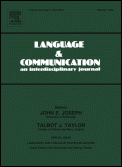
LANGUAGE & COMMUNICATION
Connecting minds through the study of language and communication.LANGUAGE & COMMUNICATION is a prestigious journal published by PERGAMON-ELSEVIER SCIENCE LTD that serves as an essential resource for researchers and practitioners in the fields of communication, linguistics, and psychology. With a focus on interdisciplinary approaches, this journal has maintained a strong impact, as evidenced by its high rankings—Q1 status in communication and linguistics, and notable categories in experimental and cognitive psychology, as highlighted by the 2023 Scopus rankings. Established in 1981, LANGUAGE & COMMUNICATION combines rigorous empirical research with practical applications, making it a critical forum for advancing understanding in language use and communication theory. While currently not an Open Access journal, it offers vital insights to academics and professionals alike, facilitating knowledge dissemination and sparking meaningful dialogue within the community. Its commitment to excellence is further demonstrated by its contributions to key areas of study, positioning it as a vital publication for anyone invested in the exploration of language and human interaction.
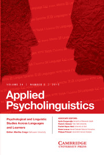
APPLIED PSYCHOLINGUISTICS
Exploring the Nexus of Language and MindApplied Psycholinguistics, published by Cambridge University Press, is a premier journal in the fields of linguistics, psychology, and cognitive science, with a focus on the intersection of language and psychological processes. Since its inception in 1980, the journal has consistently provided a platform for high-quality research, achieving impressive rankings in various categories as of 2023, including Q1 status in Linguistics and Language, and Q1 in Psychology (miscellaneous). With a focus on experimental and cognitive psychology, it fosters the exploration of language acquisition, social communication, and cognitive mechanisms underlying language use. Although it is not available as an Open Access journal, its rigorous peer-review process and impactful articles make it a significant resource for researchers, professionals, and students alike. The journal's commitment to advancing knowledge is evident through its contributions to both theoretical and applied psycholinguistic research. Whether you're a seasoned researcher or a student eager to delve into psycholinguistics, this journal serves as an essential resource for keeping abreast of cutting-edge developments in the discipline.
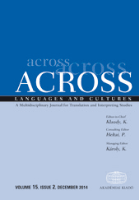
Across Languages and Cultures
Exploring the Intersections of Language and CultureAcross Languages and Cultures is a leading journal in the field of Linguistics and Language, published by AKADEMIAI KIADO ZRT in Hungary. With its ISSN 1585-1923 and E-ISSN 1588-2519, the journal has established itself as a prominent platform for advancing research and discussion in the dynamics of language across diverse cultural contexts. Its impressive Q1 category ranking indicates its significant influence, with a Scopus rank of #227 in Language and Linguistics, showcasing its robust academic impact (79th percentile). This journal, converging from 2007 to 2024, aims to foster interdisciplinary dialogue and promote innovative research methodologies in multilingual studies. Though not an open-access journal, Across Languages and Cultures provides invaluable insights for researchers, professionals, and students eager to explore the intricacies of language use and its sociocultural implications. Located at Budafoki Ut 187-189-A-3, H-1117 Budapest, Hungary, it continues to serve as an essential resource for those passionate about the linguistic sciences.
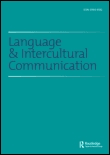
Language and Intercultural Communication
Transforming Communication Through Cultural AwarenessLanguage and Intercultural Communication is a leading peer-reviewed journal published by Routledge Journals, Taylor & Francis Ltd, based in the United Kingdom. With an ISSN of 1470-8477 and an E-ISSN of 1747-759X, this esteemed publication has established itself as a vital resource in the fields of Communication and Linguistics, boasting an impressive Q1 classification in both categories as of 2023. The journal's scope encompasses a broad range of topics related to language and its role in intercultural contexts, making it an essential platform for researchers, professionals, and students alike who wish to contribute to and learn from the latest scholarly discussions. Even without an open-access option, its high impact factor and strong Scopus rankings, which place it in the 87th percentile for Linguistics and Language, affirm its significance in shaping contemporary dialogue. As we move towards 2024, Language and Intercultural Communication continues to foster academic exchanges that challenge, expand, and enrich understanding across diverse linguistic and cultural landscapes, making it a must-read for anyone interested in the intersection of language and culture.